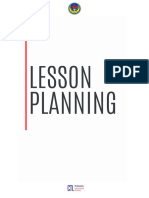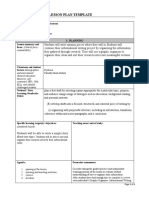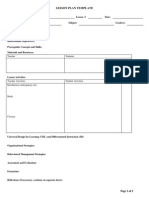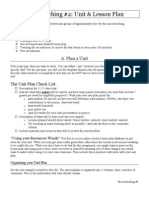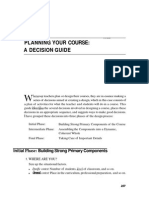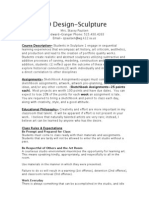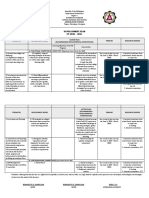0 ratings0% found this document useful (0 votes)
22 viewsUnit Planning: Andrews University
The document provides a template for developing a unit plan, with sections for an overview/general goal, rationale, objectives, content, learning activities, and evaluation. It is intended to help teachers systematically plan a unit, linking objectives to content, activities, and assessment. The template is designed to give structure to unit planning and ensure coherence across the different components.
Uploaded by
sadia mehmoodCopyright
© © All Rights Reserved
Available Formats
Download as PPT, PDF, TXT or read online on Scribd
0 ratings0% found this document useful (0 votes)
22 viewsUnit Planning: Andrews University
The document provides a template for developing a unit plan, with sections for an overview/general goal, rationale, objectives, content, learning activities, and evaluation. It is intended to help teachers systematically plan a unit, linking objectives to content, activities, and assessment. The template is designed to give structure to unit planning and ensure coherence across the different components.
Uploaded by
sadia mehmoodCopyright
© © All Rights Reserved
Available Formats
Download as PPT, PDF, TXT or read online on Scribd
You are on page 1/ 21
Unit Planning
Andrews University
Department of Teaching and Learning
Principles of Teaching
Presentation Developed by Mr. Bradley Sheppard
Board Work – Focus On Outcomes
The following examples of objectives DO NOT focus on
intended learner outcomes. Rewrite them so they do
represent intended learner outcomes.
Students will participate in a discussion on mammals.
Students will state how Roman civilization was like Greek
civilization.
Students will demonstrate their enthusiasm for painting.
Students will play basketball.
Students will know all the books of Laura Ingalls Wilder.
Students will go to the Museum of Fine Arts and write a paper
on their favorite painting.
Unit Topics:
Selected Content Areas
Art Home Economics
Watercolors Nutrition
Perspective Fabrics
Pottery Money Management
Printmaking Baking
Physical Education Music
Aerobic Exercise Rhythm
Tennis Jazz
Body Conditioning Wind Instruments
Swimming Classical Era
Do Activity
Write out four or five different unit topics
for your own particular content area(s).
Share your unit topics with your partner.
Unit Plans – Benefits
For Teachers: Help bridge gap between
long-term planning and daily lesson plans.
For Students: The components (goals,
objective, content, activities) are tied
together in a logical coherent manner,
providing structure for the new material to
be learned.
Unit Plan: Overview/Goal
Describes the Example: “This unit is
purpose of the Unit intended to develop
fourth-graders’ ability to
Starting point for unit use reference files, both in
planning process paper form and on
Conceptual organizer computer. This unit will
focus on titles, authors,
for the rest of the
and subject files.”
planning process
Communicates
instructional intent to Teach This Concept
students, teachers, To Your Partner
and administrators.
Do Activity
Write an overview/goal for one of the unit
topics that you wrote a few minutes ago.
Share your overview/goal with your team.
Unit Plan: Rationale
Example: “Understanding
Explains why the unit is reference systems and how
important and how it will they’re organized is
benefit students necessary for students using
the library. They need to be
Encourages teacher to able to locate desired
be thoughtful and materials to use in research
projects, and eventually they
reflective while planning
need to be able to work
Connects new content independently. Because
to other topics many libraries have both
physical and computerized
Helps students see cataloging systems, students
importance of topic and should understand
both.”
adds motivation
Teach this concept to your partner!
Do Activity
Write a rationale for one of the unit topics
you wrote a few minutes ago.
Share your rationale with your partner.
Unit Plan: Objectives
Deal specifically with “What Example: “Given a ruler
do I want my students to and compass,
learn?”
geometry students
Involves translating general
goals into more specific
will construct the
objectives bisector of an angle
Desired Educational within 1 degree of
Outcomes listed in specific error.”
terms.
A description of a content area
or skill Teach this concept
A statement of what students to your partner!
will be able to do when they
reach the objectives
Do Activity
Write two or three objectives for one of the
unit topics you wrote a few minutes ago.
Share your objectives with your partner.
Unit Plan: Content
Describes what students Examples: Schematic
will actually be studying Diagrams, Hierarchies,
The information students and Outlines are all
will know or understand, effective ways of
or the skills they will organizing and
develop communicating the way
The way information is the content is organized.
organized
Teach this concept to
your partner!
Do Activity
Write one “small” segment of the course
content section for a unit plan from one of
the topics you chose a few minutes ago.
– You may create brief outline or diagram.
– Do not write anything elaborate right now.
Share your “Content” section with your
partner.
Unit Plan: Learning Activities
Most important part of Example: Cooperative
the Unit Lessons and Today’s
Elementary or Lesson called Say-
Secondary Methods See-Do.
“What you teach
should influence how Teach this concept
you teach and how to your partner
your students should
learn”
Do Activity
Brainstorm with your partner a list of ways
you can teach the objectives you wrote a
few minutes ago.
Unit Plan: Evaluation
Provides students Connected to all other
with feedback and parts of the unit plan
feedback facilitates The way you measure
learning student learning depends
on what you want
Provides teachers
students to learn
with information about (objectives) and the
students’ learning learning activities
progress involved.
Allows teachers to Teachers test what they
make decisions about have taught.
what to do next
Unit Plan: Evaluation
Example: “What are the three kinds of
reference systems?” OR “Go to the card
catalog and locate the author’s name and
call number for each title listed below.”
Teach this concept to your partner
Do Activity
Write ONE evaluation question for one of
the unit topics you wrote earlier in the
period.
Share your question with your partner.
Unit Components
Components Function
Overview/General Summarizes the general
Goal purpose of the unit
Rationale Answers the question, “Why
is this topic important?”
Objectives Describe the specific
outcomes expected
from the unit
Unit Components
Components Function
Content Identifies and organizes the
topics that are included in the unit
Learning Activities Describe the experiences that will
be used to help learners reach the
unit objectives
Evaluation Identifies ways that learning will be
measured
Andrews University
Department of Teaching and Learning
Unit Planning Guide
Subject: Grade:
Overview/General Goal:
Rationale:
Objectives Content Activities Learning Activities Days
Evaluation:
You might also like
- Writing Student Learning Objective 12-06-2010No ratings yetWriting Student Learning Objective 12-06-20102 pages
- A Taste of A Snicker of Magic Lesson PlanNo ratings yetA Taste of A Snicker of Magic Lesson Plan2 pages
- Materials and Resources:: Lesson Plan TemplateNo ratings yetMaterials and Resources:: Lesson Plan Template3 pages
- Differentiated Lesson Plan Written ExpressionNo ratings yetDifferentiated Lesson Plan Written Expression5 pages
- Inquiry Lesson Plan: Teachers: Subject: GradeNo ratings yetInquiry Lesson Plan: Teachers: Subject: Grade2 pages
- Diaz Sc21 Lesson 2 Module 2 Minor ActivityNo ratings yetDiaz Sc21 Lesson 2 Module 2 Minor Activity15 pages
- Read - Edtpa Lesson Plan Car Spring 2015 Annotated 8No ratings yetRead - Edtpa Lesson Plan Car Spring 2015 Annotated 87 pages
- Strategies For Effective Lesson PlanningNo ratings yetStrategies For Effective Lesson Planning6 pages
- Designing Process-Oriented Guided-Inquiry ActivitiNo ratings yetDesigning Process-Oriented Guided-Inquiry Activiti7 pages
- Activity Guide and Evaluation Rubric - Task 1 - Designing A Teacher Development Strategy PDFNo ratings yetActivity Guide and Evaluation Rubric - Task 1 - Designing A Teacher Development Strategy PDF11 pages
- Instructional Design: Course Duration: 17 HoursNo ratings yetInstructional Design: Course Duration: 17 Hours4 pages
- Edpr4100 Sciencesandslesson4sitesearchpart2No ratings yetEdpr4100 Sciencesandslesson4sitesearchpart24 pages
- Inquiry (5E) Lesson Plan Template: For TeachersNo ratings yetInquiry (5E) Lesson Plan Template: For Teachers5 pages
- Department of Education Bureau of Learning Delivery Teaching and Learning DivisionNo ratings yetDepartment of Education Bureau of Learning Delivery Teaching and Learning Division7 pages
- Echnology Ntegration Lan: General Overview For Creating and Maintaining A T.I.PNo ratings yetEchnology Ntegration Lan: General Overview For Creating and Maintaining A T.I.P8 pages
- UNIT PLAN TEMPLATE (Adapted From Thompson Rivers University)No ratings yetUNIT PLAN TEMPLATE (Adapted From Thompson Rivers University)6 pages
- Steps For Syllabus Design: Developing A Course SyllabusNo ratings yetSteps For Syllabus Design: Developing A Course Syllabus8 pages
- Teaching Language Elements - Lesson Plan TemplateNo ratings yetTeaching Language Elements - Lesson Plan Template2 pages
- Lessonplan 2 2 Planning Responses ASAL General PaperNo ratings yetLessonplan 2 2 Planning Responses ASAL General Paper4 pages
- (Ebook PDF) Psychology: Modules For Active Learning 14th Edition Ebook All Chapters PDF100% (2)(Ebook PDF) Psychology: Modules For Active Learning 14th Edition Ebook All Chapters PDF51 pages
- Principles of Teaching According To Various Authors: (Fleming 1996)No ratings yetPrinciples of Teaching According To Various Authors: (Fleming 1996)20 pages
- Development Plan SY 2020 - 2021: Senior High SchoolNo ratings yetDevelopment Plan SY 2020 - 2021: Senior High School2 pages
- Claudio Terán Valdés Pedagogical Management Richard Allan Bair Exploring Special Aspects of Classroom ManagementNo ratings yetClaudio Terán Valdés Pedagogical Management Richard Allan Bair Exploring Special Aspects of Classroom Management4 pages
- The Strengths and Weaknesses of Task Based Learning (TBL) Approach.No ratings yetThe Strengths and Weaknesses of Task Based Learning (TBL) Approach.12 pages
- Contemporary Practice in Education Research Action Research Proposal Michael Allen - 110045956No ratings yetContemporary Practice in Education Research Action Research Proposal Michael Allen - 11004595619 pages
- Critical Synthesis Paper Rubric 08-13-23No ratings yetCritical Synthesis Paper Rubric 08-13-232 pages
- Major Research Project (MRP) : Prestige Institute of Management and Research, IndoreNo ratings yetMajor Research Project (MRP) : Prestige Institute of Management and Research, Indore7 pages
- Improving Students' Speaking Achievement Through Public Speaking TasksNo ratings yetImproving Students' Speaking Achievement Through Public Speaking Tasks8 pages
- Read - Edtpa Lesson Plan Car Spring 2015 Annotated 8Read - Edtpa Lesson Plan Car Spring 2015 Annotated 8
- Designing Process-Oriented Guided-Inquiry ActivitiDesigning Process-Oriented Guided-Inquiry Activiti
- Activity Guide and Evaluation Rubric - Task 1 - Designing A Teacher Development Strategy PDFActivity Guide and Evaluation Rubric - Task 1 - Designing A Teacher Development Strategy PDF
- Department of Education Bureau of Learning Delivery Teaching and Learning DivisionDepartment of Education Bureau of Learning Delivery Teaching and Learning Division
- Echnology Ntegration Lan: General Overview For Creating and Maintaining A T.I.PEchnology Ntegration Lan: General Overview For Creating and Maintaining A T.I.P
- UNIT PLAN TEMPLATE (Adapted From Thompson Rivers University)UNIT PLAN TEMPLATE (Adapted From Thompson Rivers University)
- Steps For Syllabus Design: Developing A Course SyllabusSteps For Syllabus Design: Developing A Course Syllabus
- Lessonplan 2 2 Planning Responses ASAL General PaperLessonplan 2 2 Planning Responses ASAL General Paper
- (Ebook PDF) Psychology: Modules For Active Learning 14th Edition Ebook All Chapters PDF(Ebook PDF) Psychology: Modules For Active Learning 14th Edition Ebook All Chapters PDF
- Principles of Teaching According To Various Authors: (Fleming 1996)Principles of Teaching According To Various Authors: (Fleming 1996)
- Development Plan SY 2020 - 2021: Senior High SchoolDevelopment Plan SY 2020 - 2021: Senior High School
- Claudio Terán Valdés Pedagogical Management Richard Allan Bair Exploring Special Aspects of Classroom ManagementClaudio Terán Valdés Pedagogical Management Richard Allan Bair Exploring Special Aspects of Classroom Management
- The Strengths and Weaknesses of Task Based Learning (TBL) Approach.The Strengths and Weaknesses of Task Based Learning (TBL) Approach.
- Contemporary Practice in Education Research Action Research Proposal Michael Allen - 110045956Contemporary Practice in Education Research Action Research Proposal Michael Allen - 110045956
- Major Research Project (MRP) : Prestige Institute of Management and Research, IndoreMajor Research Project (MRP) : Prestige Institute of Management and Research, Indore
- Improving Students' Speaking Achievement Through Public Speaking TasksImproving Students' Speaking Achievement Through Public Speaking Tasks







